Reuter's Media Magic Working for Helen Duncan
Helen Duncan's Pardon Campaign Gathers Momentum Again
Each October since 2004 when we remember the 81 Pardoned Witches of Prestonpans at Hallowe'en Mary Martin, Helen Duncan's grand daughter, has joined us. She has laid her own posie of herbs at our memorial mural.
But her grandmother has never be pardoned and indeed Mary's search for such a pardon was rebuffed in 1999 by then Home Secretary Jack Straw. He declined to recommend a Pardon to HM The Queen.
2006 was the 50th anniversary of the death of Helen Duncan the last woman, and a Scot at that, in the United Kingdom to be prosecuted and imprisoned under the Witchcraft Act 1735. And it took place unbelievably in 1944. [Winston Churchill had later aptly described the circumstances surrounding the trial in London as tom foolery.]
Mary Martin asked whether we at the Prestoungrange Arts Festival and the Barons' Courts could give her help to get Helen's case for a Pardon reviewed again in London. She did so in the context of her continuing sense of outrage at the sentence but also in the context of the recent mass pardoning of British soldiers convicted and executed for cowardice in the 1st World War.
The Internet To be Used as a Source of Support
It was mutually agreed that perhaps the greatest contribution we could make from Prestopnpans, where we shared her outrage and were somewhat knowledgeable on the matter because of our own much earlier involvements, was to create publicity for the case and to establish a website at which support could be logged. This is now available HERE
Reuter's Global News Network Once Again Tells the Tale
We had witnessed massive global interest in the Barons' Courts Pardons of our 81 local witches in 2004. And we knew that much of that was owed to Reuter's networking of our stories and news then. So it was deeply satisfying when Reuter's again asked for the details of the case to be released on January 14th worldwide. The first report, taken from the Washington Post, appears below.
Click on the images to enlarge them
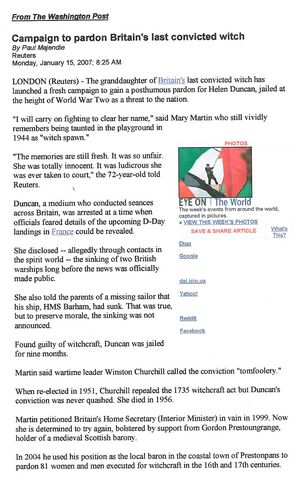
____________________________________________
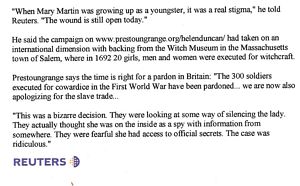
The syndicated service from Reuter's has within two days brought the total of named Supporters to more than 1000 for the Campaign, and the case has been recounted in 44 additional news media and on countless blogs globally. Descendants of Salem's Rebecca Nourse Family have offered their support as have caring people right across North America, from Asia, Australasia and Europe. CNN and the BBC have both broadcast details of the case and the proposed new request for a Pardon for Helen Duncan - just as they covered our own original Pardonning in Prestonpans in 2004.
Later Reports included those shown below from China, Australia and Spain.
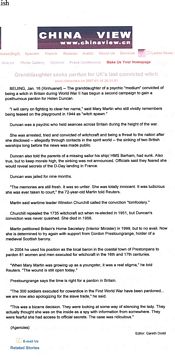 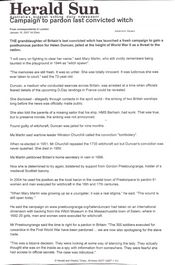 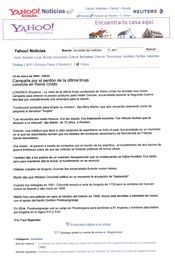
__________________________________________________________
[Editor's Note on Reuter's]
Paul Julius Reuter, born to a rabbi in Kassel, Germany noticed that news need no longer take days or weeks to travel from one country to another using electric telegraph. In 1850, the 34-year-old Reuter was based in Aachen, Germany (close to the Dutch and Belgian border) and began to use the newly opened Berlin-Aachen telegraph to send news back to Berlin. But there was a 76-mile gap in the telegraph between Aachen and Brussels. Reuter spotted the opportunity to speed up news between Brussels and Berlin by using homing pigeons to bridge the gap in the telegraph.
In 1851, Reuter moved to London as attempts to lay a submarine telegraph cable from Dover to Calais looked to be succeeding after earlier failures in 1847 and 1850. He set up his Submarine Telegraph office in October 1851 just before the opening of the cable in November, and agreed to a contract with the London Stock Exchange to provide stock prices from the continental exchanges in return for access to the London prices, which he supplied to Paris brokers.
In 1865, Reuter's private firm was restructured and became a limited company called Reuter's Telegram Company. Reuter had been naturalised as a British subject in 1857.
Reuter's agency built a reputation in Europe for being the first to report scoops from abroad, like the news of the assasination of Abraham Lincoln. Today, almost every major news outlet in the world subscribes to Reuters. It operates in 200 cities in 94 countries, supplying text in 19 languages.
Published Date: January 16th 2007
|





